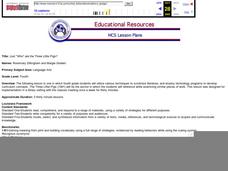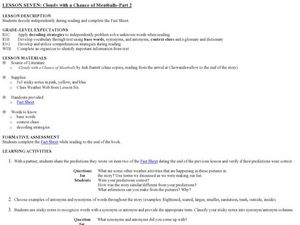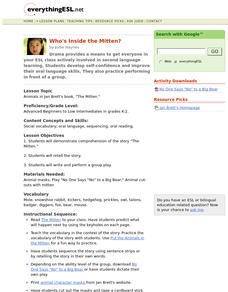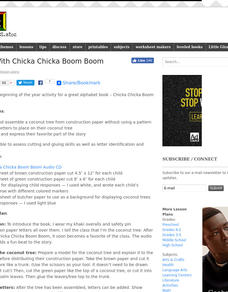Curated OER
Story Parts
Third graders identify the three major parts of a story. After reading the book "Stellaluna," students discuss the beginning, middle and end of the story. They write a short story depicting the events that would happen if the story...
Curated OER
Making Mittens with The Mitten Book
Students read The Mitten, by Jan Brett, and discuss the different animals in the book. They create a pair of paper mittens that look alike.
Curated OER
The Lorax
Students read The Lorax and discuss how human actions can affect the environment. They conduct a simple experiment to see how much air pollution is in the air that they breathe.
Curated OER
Stepping Stones
Students listen to stories read aloud. They examine a work of art by a known artist. Students take a picture using the digital camera. They listen as the teacher reads "Where the Wild Things Are." Students compare and contrast the...
Curated OER
Visualizing While Reading
Third graders listen to the story Where the Wild Things Are, and draw pictures to illustrate what they think is happening. Students share their visualizations with their partners.
Curated OER
How to Make an Edible Brown Bear
Students follow directions on how to make an edible brown bear. For this following directions lesson plan, students make their bear out of bagels, peanut butter, crackers, and more.
Curated OER
Literature/Math Crossover Lesson Plan - Word Problems
First graders, after listening to the story I Can Lick 30 Tigers Today! think of a word problem of their own. They do this at their desks in their pre-assigned learning groups.
Curated OER
Technology-commected Folklife Lesson Plan: Fables
Learners discuss ways the stories were alike and different. The teacher demonstrate how to draw a Venn diagram using Microsoft Word. They label the two circles and enter the likenesses and differences on the diagram.
Curated OER
Seussville Meets the 4 Blocks
First graders read and examine Dr. Seuss books, and create and write their own stories.
Curated OER
Just "Who" are the Three Little Pigs?
Fourth graders use a Venn diagram to compare and contrast various versions of the story The Three Little Pigs. They write a Cinquain, and then act out their version of the Three Little Pigs in a skit.
Curated OER
Comparing Similar Themes in Art And Literature
Students view examples of Rembrandt's artistic works that include beggars and the unfortunate. They also read The Whipping Boy by Sid Fleischmann. They use a Venn diagram to compare and contrast the themes shared by each.
Curated OER
Chicken Little
Second graders listen to the story "Chicken Little" as it is read to the whole group while recognizing similarities in the character's names. They create another character to be added to the story using the same rhyming pattern and make...
Curated OER
More Simulations: Decisions, Decisions! and Flat Stanley
Students investigate the concepts related to instructing students using Flat Stanley in the Social Studies classroom. They examine the different instructional materials and are shown how to present the material to class. The focus is...
Curated OER
A Speech for the Sneetches
Students write a speech using Dr. King as an example and the characters from a Dr. Seuss book. In this speech lesson, students read the 'I Have a Dream' speech and use it as a guide to help them write a speech based on the book Sneetches...
Curated OER
Comparing and Contrasting Fiction and Nonfiction Using Graphic Organizers
Learners compare and contrast fiction and non-fiction selections. In this writing skills lesson, students use different forms of graphic organizers to compare "The Three Little Pigs," to Wiesel's Night.
Curated OER
Cloudy with a Chance of Meatballs - Part 2
Learners recognize synonyms and antonyms. In this reading strategies activity, students use the book Cloudy with a Chance of Meatballs by Judi Barrett to make predictions, and correctly recognize synonyms and antonyms.
Curated OER
Looking at a Community
Third graders read Flat Stanley. In this community lesson, 3rd graders discuss the town they live in, define the terms community, citizen and culture, discuss what a community is and the characteristics of a community.
Curated OER
Wild Things
Students draw a literacy response picture demonstrating knowledge and appropriate use of computer hardware components (monitor, mouse) using KidPix and Kidspiration software with a minimum of two different pictorial details on their...
Curated OER
Who's Inside the Mitten?
Students read "The Mitten", by Jan Brett. They discuss vocabulary presented in the story and sequence significant plot events. They make masks to represent several of the characters and act out the story.
Curated OER
Fun With Chicka Chicka Boom Boom
Students complete various activities for the book, "Chicka Chicka Boom Boom." They listen to the story, construct a coconut tree, create paper letters for the coconut tree, and write about their favorite part of the story.
Curated OER
10 Apples Up On Top
Stuents make class books as a follow up activity to the Dr. Seuss book Ten Apples Up On Top!
Curated OER
Tortoise and Hare Races
Students listen to the fable, The Tortoise and the Hare, and participate in various map skill activities. They manipulate magnetic tortoises and hares on metal cookie sheets to practice direction, and construct racing tortoises out of...
Curated OER
It's Time for a Rhyme
Students listen to the story, There's a Wocket in My Pocket, by Dr. Seuss. They discuss the rhyming in the book and then play a rhyming game.
Curated OER
Left Foot, Right Foot
Students listen to "The Foot Book", by Dr. Seuss. They participate in a discussion/activity about the book and feet. They trace their feet, label them 'left foot' and 'right foot' and compare their drawings to one another.
Other popular searches
- Children Literature Legends
- Literature Children
- Children Literature Articles
- Children Literature Books























